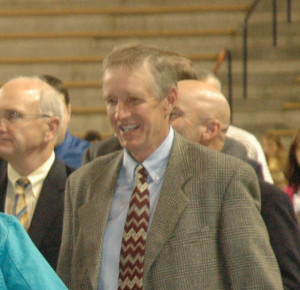Will apply to state for budget exceptions allowing tax hike as high as 3.3%; will still look to cut budget down to a 1.4% increase
By Mike McGann, Editor, UnionvilleTimes.com

Unionville-chadds Ford Board of Education member Keith Knauss said he will continue to fight to keep the schools tax increase to 1.4%, Monday night.
EAST MARLBOROUGH — The Unionville-Chadds Ford Board of Education opted Monday night to keep its options open regarding use of possible exemptions to the state limits on tax increases.
The limit, tied to rate of inflation, imposed by the state under Act 1 for 2011 is an increase of 1.4%. With exceptions for retirement expenses — primarily pensions — and special education, districts could in theory raise taxes as much as 3.3%.
Keith Knauss, the board finance committee chair, offered the idea of adopting a resolution that the board would not apply for the exceptions, essentially locking them in right now at the start of the budgeting process, but found little support from his colleagues, who seemed inclined to maintain as much flexibility as possible — much as was the case for last year’s budget process.
The preliminary budget, based on the 3.3% increase, as prepared by district Director of Business and Operations Robert Cochran and his staff, calls for raising $71.2 million from taxes and spending another $200,000 from existing surplus. Estimates suggest about $1 million would need to be cut from the budget to get it down to the 1.4% increase.
Spending, under the proposed plan, is only up 1.8% — but the district is coping with the first reduction in real estate assessments across the district in recent memory, while there was a slight uptick in the values of Delaware County properties in the district — in Chadds Ford — assessed values in Chester County have actually fallen, in part because of declining real estate prices and property assessment appeals filed by property owners, meaning the net district-wide assessment is down. Over the last decade that assessment has steadily climbed, some years as high as 4% during the building boom and rapid rise of real estate values. In recent years, that growth slowed, cutting revenue to the district — before 2010’s drop in value.
Another problem: collections. When the economy was going well, the district could count on collecting more than 99% of its taxes, but because of bankruptcies and defaults, that rate has fallen below 98% — and is now budgeted for just 97.5%. As the vast majority of revenue comes to the school district from real estate, each percent drop represents more than $500,000 in lost revenue to the district.
Still, there remain any number of unknowns. The ongoing talks to get a new contract with the teachers union are one financial variable, and it remains an open question of whether some $350,000 in state funds — originally paid for by now-expired federal stimulus funds — will still be coming to the district as incoming Gov. Tom Corbett has pledged not to raise taxes despite the state facing a roughly $5 billion budget deficit. Sources in Harrisburg suggest there could well be cuts in funding to local school districts, as the state struggles to make its own budget work.
Another issue: the district would have about eight days to put together a new budget at the lower numbers so board members could see the impact of the cuts, deemed not to be enough to fully consider the options. Superintendent of Schools Sharon Parker assured board members that a budget at that level would be prepared in the coming days — to give directors a full picture of the financial options, but she allowed that the financial situation is “sobering.” Like last year, she said, various levels or “tiers” of cuts will be offered, as well as the impact on various programs.
“I lean toward adopting the resolution,” Knauss said. “But on the other hand, I don’t know when were going to be able to look at the tiered cuts.”
Other directors were very hesitant to forego the exceptions without all of the information.
“I’m not comfortable locking us in until we have all of the information,” Eileen Bushelow said.
“Really, the only benefit would be to keep some voters happy,” Holly Manzone said.
Still, even without the resolution, Knauss said he would work to keep the budget at 1.4% — noting that many residents and taxpayers have not seen any increases in income of late.






